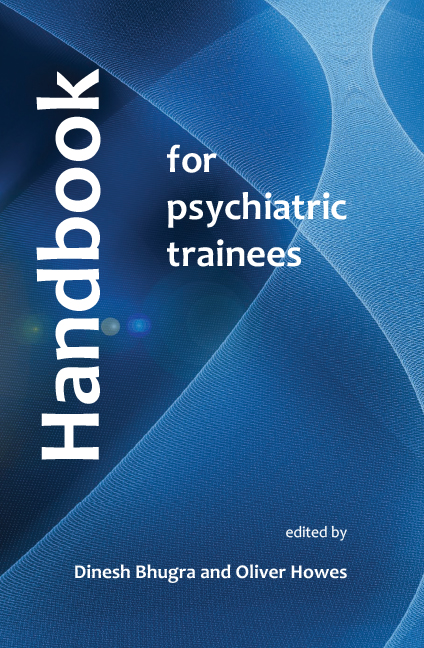Book contents
- Frontmatter
- Contents
- List of tables, boxes and figures
- List of contributors
- 1 Psychiatric training: the next steps
- Part 1
- 2 Global healthcare systems
- 3 History and structure of the National Health Service
- 4 The College
- 5 The General Medical Council
- 6 Ethical reasoning in psychiatry
- 7 Compulsory treatment, capacity and consent
- Part 2
- Part 3
- Index
3 - History and structure of the National Health Service
from Part 1
- Frontmatter
- Contents
- List of tables, boxes and figures
- List of contributors
- 1 Psychiatric training: the next steps
- Part 1
- 2 Global healthcare systems
- 3 History and structure of the National Health Service
- 4 The College
- 5 The General Medical Council
- 6 Ethical reasoning in psychiatry
- 7 Compulsory treatment, capacity and consent
- Part 2
- Part 3
- Index
Summary
It is perhaps important for everyone working in the National Health Service (NHS) to have some idea of the origins, development and current structure of what is one of the biggest and most complicated organisations in the world. A detailed analysis of the NHS and its history is beyond the scope of this chapter; suggestions for further reading are given at the end. The purpose of the chapter is instead to outline briefly how the NHS has evolved and to put into perspective the changes it was undergoing in 2006. For more recent developments the Department of Health'swebsite (http://www. dh.gov.uk) should be consulted.
Healthcare before the NHS
Until the middle of the 19th century, the state had virtually no control over the medical profession. Doctors had developed their own organisational structure which satisfied the need for self-regulation. Members of the Royal College of Physicians mainly worked in the London teaching hospitals and treated those who could afford their fees. Members of the Royal College of Surgeons (which had been the Company of Barbers a century before) were more experienced in the practice of medicine and treated patients both in London (in competition with the physicians) and outside. The vast majority of people were treated by members of the Society of Apothecaries, who basically prescribed medication. For a considerable period of time churches provided forms of treatment to people with mental illnesses.
The state became more involved in the health of the population and regulation of the medical profession throughout the 19th and early 20th centuries. The 1834 Poor Law was an early acknowledgement that government had some responsibility for the care of the population. Among its effects were the statutory provision of a parish medical officer to care for the poor and the establishment of parish workhouses with sick wards where able-bodied inmates could be treated when they became ill (Levitt, 1976). Free services were offered by boards of guardians to those who could pass a means test.
The Public Health Act 1848 established statutory powers that enabled a local medical officer of health (an official of the local authority) to cater for the health of the local population. Following the Poor Law reforms, the medical officers’ responsibilities were extended to some Poor Law hospitals, which were considered to be providing healthcare rather than welfare.
- Type
- Chapter
- Information
- Handbook for Psychiatric Trainees , pp. 29 - 53Publisher: Royal College of PsychiatristsPrint publication year: 2008



